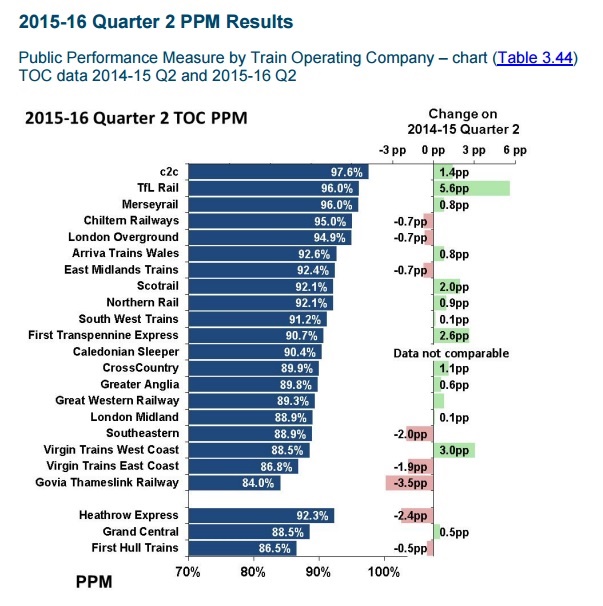20.11.15
Worst punctuality on Thameslink routes for a decade
Govia Thameslink Railway (GTR) has recorded the worst quarterly punctuality figures for the routes it runs since 2004-5, at just 84%.
Office of Rail and Road (ORR) figures have shown that the operator also had the steepest fall (3.2 percentage points) in its PPM figure this past quarter compared with last year, the lowest amount of peak services arriving on time, and the worst amount of overall cancellations and lateness since the time series began in 2004-5.
The national average figure was 90.3% during the second quarter of 2015-16, down slightly (0.2 percentage points) on the same quarter the year before.
Historically, the lowest quarterly performance scores are recorded by the long distance operators – but GTR has bagged this spot in the last four consecutive quarters.
The ORR said this sustained poor performance could be attributed to ongoing works at London Bridge, as well as major delay incidents during this past quarter – such as an empty train dividing at Battersea Park, a trespasser near East Croydon and a track fault at Purley.
When Network Rail released its Period 7 PPM figures last month, GTR’s performance had slumped below 83%, the worst of all operators, after it had begun to recover in previous periods. But this was largely driven by its sub-operator, Gatwick Express – the only route with a performance below 80% at the time.
Elsewhere, the ORR figures show that TfL Rail’s performance improved by nearly six percentage points compared with the same quarter last year. The relatively new operator was launched in May to take over Greater Anglia services into and out of London Liverpool Street as the precursor to full Crossrail services once the whole Crossrail network is ready.
Its performance has been generally high, according to both the Network Rail and ORR statistics. Last quarter, it was beaten only be c2c – which operates on routes with little interaction with other TOCs, though its managing director disputes that this is the reason for its success – in terms of performance.

In terms of cancellations and significant lateness, c2c once again achieved the best score (1.1%) – but Chiltern Railways (1.3%) and Northern Rail (1.5%) were close seconds, even though the operators did not top the PPM list.
Caledonian Sleeper, which runs 42 timed trains per week, recorded the largest amount of cancellations and delays, with almost 7% of services in the second quarter being late.
But as well as the small number of services it runs, its performance is volatile due to the ‘domino effect’ nature of its services. If the Highland Sleeper is delayed on the London to Edinburgh leg of the journey, then onward services to Aberdeen and Fort William will also be delayed, for example.
Its poor performance and lateness can also be owed in part to locomotive failures.
On a more positive note, 13 of the 19 franchised operators for which comparable data exists had a higher percentage of trains on time compared to the same quarter last year. Eleven of them also had a better score regarding cancellations and significant delays.